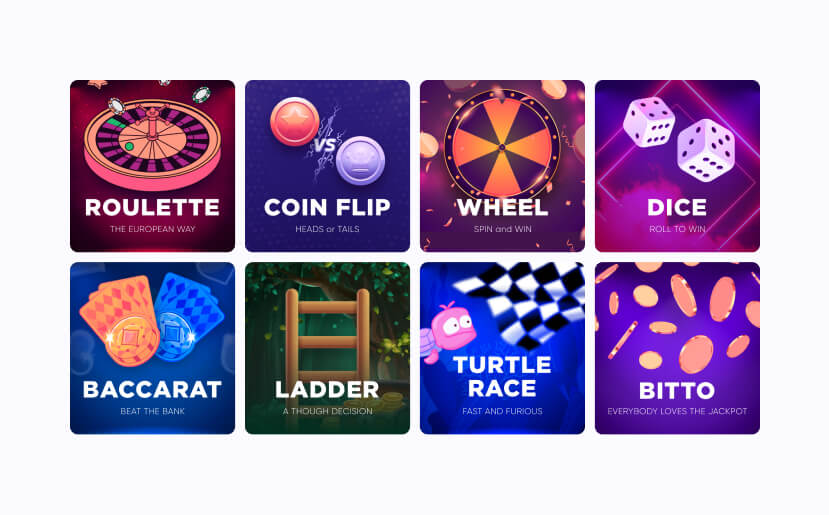Peergame Story
Satoshi Dice
In 2012, a guy named Eric Voorhees launched SatoshiDice.com, the first-ever Bitcoin-based gambling site. In fact, SatoshiDice was the first “Killer app” of Bitcoin that worked. Tens of thousands of early Bitcoin adopters bet an enormous amount of bitcoins. At one point, SatoshiDice alone was responsible for more than 50% of the daily network volume on the Bitcoin blockchain.
SatoshiDice showed that the Bitcoin app could provide a much better user experience than traditional internet services. It didn’t require registration, deposit, or withdrawal process to play the game. People could visit the site and scan the QR code to make a transaction and get the reward instantly back to their wallets. It was fast and cheap. It allowed users to control their data and money.
SatoshiDice was more than just a gambling site. It introduced the post-Bitcoin internet, where users control their data and money via the Bitcoin database, and services are linked to that database. This meant that Bitcoin apps, which are independently built from all over the world, can form a giant economic network where every app is inter-connected. Centralized and silo’ed architecture of identity and money was a thing of the past.
The Fall of Bitcoin
Unfortunately, this vision didn’t take off. Eric Voorhees sold SatoshiDice to an anonymous buyer for 126,315 BTC in 2014, and Bitcoin stopped scaling. Soon after, Bitcoin Core became so slow and expensive that SatoshiDice was no longer able to function. It was a pivotal moment in Bitcoin history. The bitcoin community chose to favor markets in capital and assets over the needs of goods and services.
It is incredible how the narrative quickly changes. If you were early in Bitcoin, you would remember the excitement around Bitcoin being accepted as a payment method by both small and big companies. People would go to ATMs worldwide to cash out their bitcoins or buy coffees by scanning a QR code. There were several Bitcoin social media applications, and you could even purchase multi-million dollar houses or boats. My friend used bitcoins to buy a Mini Cooper from Andreas Antonopoulos over Twitter. I watched the whole process, and it was terrific.
Things have changed. The world of Bitcoin utilities is wholly wiped out. Entrepreneurs shifted their business from building utilities to building financial markets. Voorhees, after selling SatoshiDice, made another successful business called Shapeshift.io, which facilitates trades between useless crypto assets. The narrative of Bitcoin as a “Peer-to-Peer cash system” has changed to a “digital store of value,” or “digital gold,” which you hold and trade but never use. Big companies all dropped their Bitcoin payment but started to put bitcoins in their corporate balance sheet instead.
Rebuilding Bitcoin
I won’t bore you with all the details around Bitcoin forks and pursuit to scaling Bitcoin. You probably already know. In 2019, some people said they will bring Bitcoin back to the original form and they did. BitcoinSV was born. It meant that there were still people who wanted the utility part of the Bitcoin-like us. The idea of the commercial internet, those early Bitcoin adopters dreamed about, was still alive.
The first thing that came to our mind was to rebuild SatoshiDice, but a better one. We could take the same principle of SatoshiDice and apply it to not only Dice game, but also other types of games, plus more broad areas of applications. Imagine you could play games, buy flight tickets, coupons, book a hotel room, and even trade crypto assets without sign-up, deposit, and withdrawal. Bitcoin services become a single utilitarian network. Entrepreneurs around the world can collectively build a digital economy.
Peergame

In 2019, Peergame.com was launched. The first game we introduced was Bitto, the lottery game. We initially wanted to copy the QR code payment experience from SatoshiDice, but there was a better platform called Moneybutton. Ryan X Charles and his team built a fantastic web payment app that allows users to swipe a button to make payments. This experience was much better than scanning a QR code every time users wanted to play.
We started developing other games like Turtle Race, Ladder Game, Dice, Wheel, Roulette, etc. Peergame quickly became the most used application in the BSV network, generating about 250,000 to 300,000 transactions per month. Suppose you include out-bound transactions, the number doubles. We knew at this moment that we built something that works, just like SatoshiDice did in 2012.
Peerjoin

Our team is very impatient. If you’re working on a startup, you should be too. We’re impatient for the future of the Bitcoin economy. We realized that the faster way to boost transactions and make BSV successful is to help others repeat what we have done, creating more apps and competitions. Even if it causes collateral damage, reducing Peergame’s market share in the BSV gaming industry is suitable for the BSV.
So we launched Peerjoin.com, the first B2B end-to-end solution for the Bitcoin-based igaming industry. Peerjoin lends out our infrastructure to companies who wish to operate their own branded gaming service and directly compete with Peergame. We’re working with several companies right now to build stand-alone gaming sites on BitcoinSV.
Day 1
I like Jeff Bezos’ Day 1 spirit. No matter how far you’ve come, it’s always day 1. Like the first day our team got together talking about what we’re going to build and how the future will be like, today is day one that we continue to work hard and keep building our dream. Peergame and Peerjoin are just a start. Peer company is working on fantastic products that we can’t wait to share with the BSV community.
Our mission is to accelerate the future of the commercial internet. And we want you to be part of it. Your feedback is essential whether you’re an investor, user, developer, designer, or thought leader. Feel free to chat with us through social media. If you’re a developer who’d like to build the future together, send us an email at contact@peergame.com. We’re always recruiting talents.






